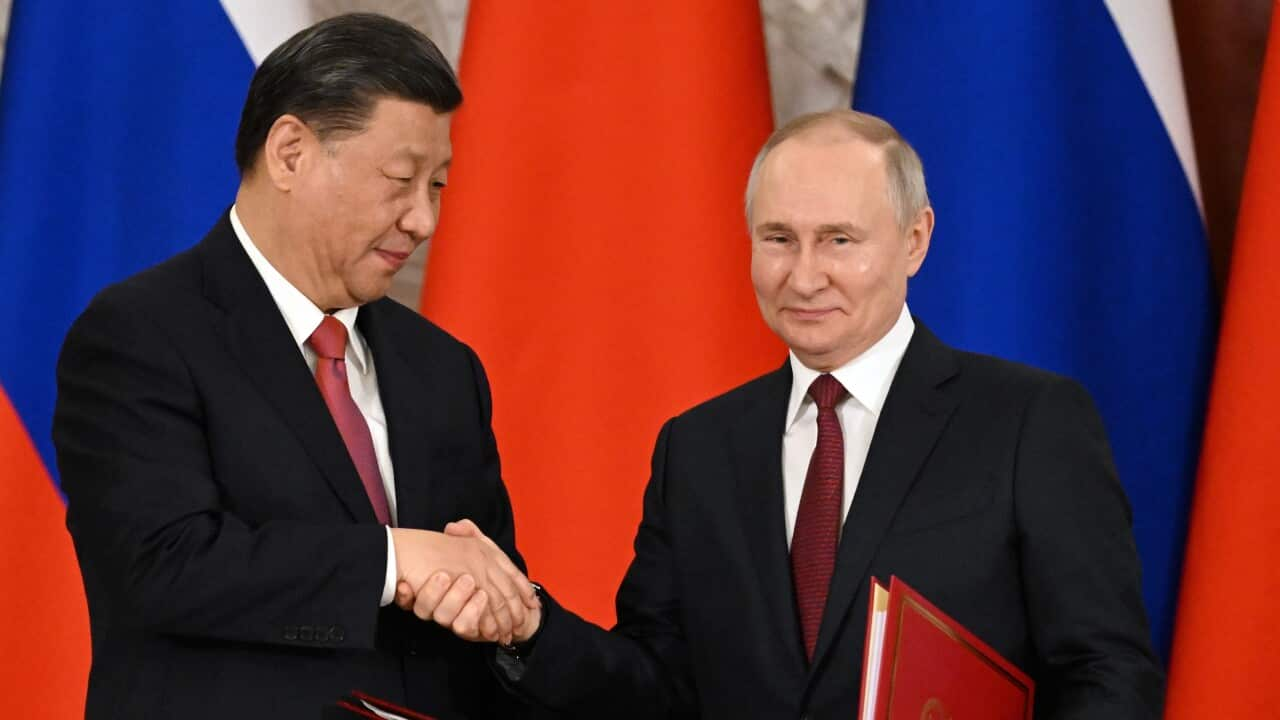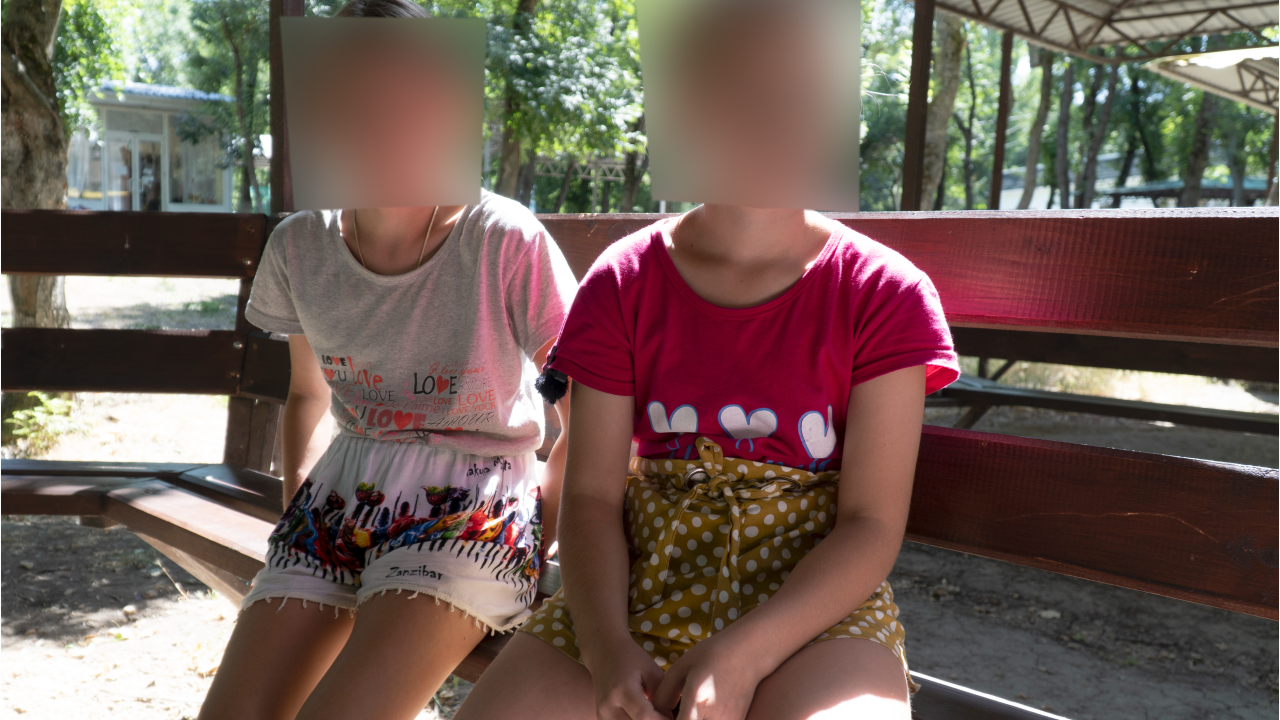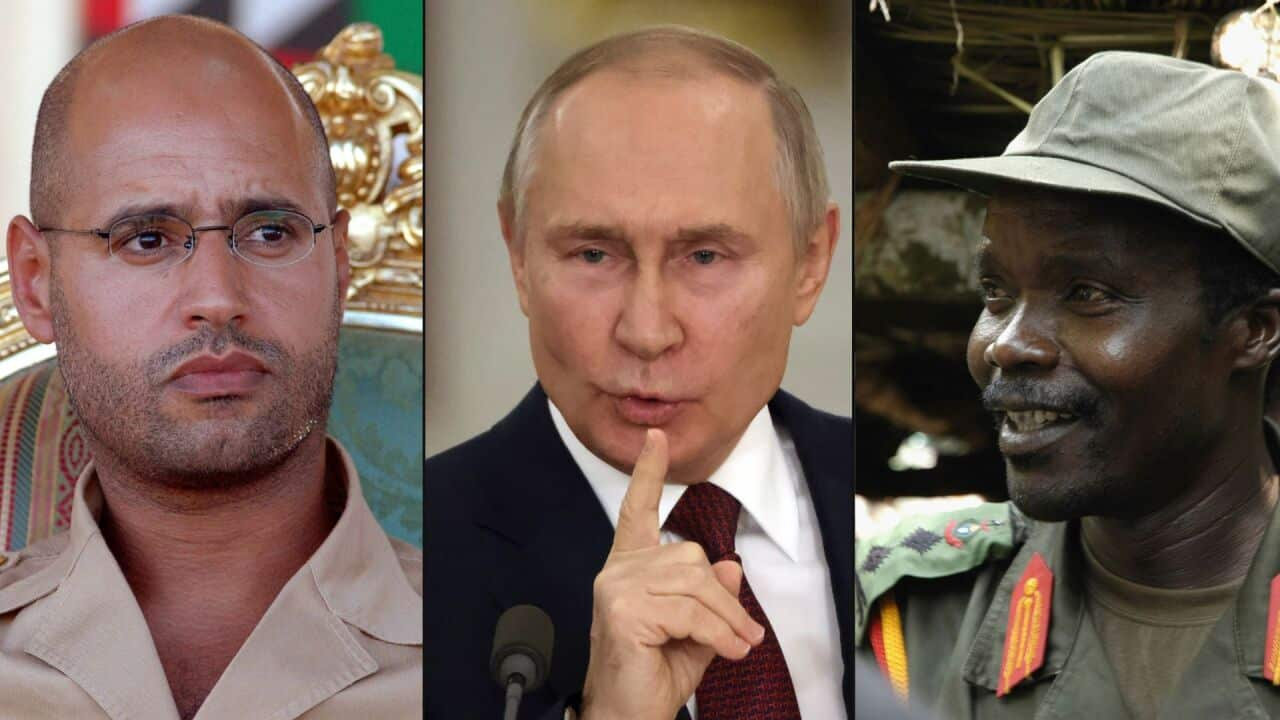Russian President Vladimir Putin is quite well-travelled. Before the COVID-19 pandemic and his country’s invasion of Ukraine, he would regularly be on the move.
In 2018, he made 21 overseas trips. In 2019, he made 23 trips. Last year, that number dwindled to nine — largely to countries close to Russia's borders, including Uzbekistan, Kazakhstan, and Belarus.
This year, South Africa, as host of the BRICS Summit, featuring the leaders of Brazil, Russia, India, China and South Africa, is on Mr Putin's travel list. But the arrest warrant hanging over his head could complicate things for both Mr Putin and the African nation.
The International Criminal Court (ICC) , alongside Russia's commissioner for children's rights, Maria Lvova-Belova.
It has focused its claims on the illegal deportation of children from Ukraine to Russia and says the crimes were committed after Russia launched its invasion in February 2022.
International criminal law expert Dr Emma Palmer, who is a senior lecturer at Queensland's Griffith University, says this warrant is the ICC asserting its position in the international space as "a tool that has geopolitical geostrategic implications".
"The deportation of children out of Ukraine to Russia is so severe that it must carry some weight, both morally and practically," Dr Palmer told SBS Dateline.
"It's interesting that they've also issued the arrest warrant for a younger minister, it sends some kind of a signal to Putin's team … that the international community is watching.
"If you're working in this government then you're part of this process of committing these war crimes."

Russian President Vladimir Putin meets with Russian Presidential Commissioner for Children's Rights Maria Lvova-Belova in February 2023. Credit: Mikhail Metzel/Sputnik/Kremlin Pool/EPA
While the United States is also not a signatory to the Rome Statute, last week US President Joe Biden welcomed the warrant and said the move was justified.
According to Ukraine, Russian forces have carried out tens of thousands of alleged war crimes since February 2022.
Professor Sascha-Dominik Dov Bachmann, a law professor at the University of Canberra, told SBS Dateline the ICC was specific in its choice of war crime because of strong evidence.
The Kremlin has been vocal about its plan to adopt and give citizenship to Ukrainian children, Mr Putin signing a decree in May 2022 to make granting citizenship to children without parental care easier, and in turn, harder for Ukraine and surviving relatives to get them back.
According to the Guardian, Russia has admitted to taking at least 1,400 Ukrainian children that it says were orphaned, but said at least 2,000 children have travelled to Russia.
Kyiv says this number is much higher. Ukraine's ombudsman on children’s rights, Daria Gerasymchuk, says Russia has deported at least 16,000 Ukrainian children.
In October 2022, a Russian government website said Ms Lvova-Belova rescued 53 children from the Donbas region that she claimed to be orphans. This year, she said she'd adopted a 15-year-old Ukrainian boy.
"The Russians did not hide that [they were taking children], they were actually proud about that," Professor Bachmann said.
"I think this transparency about the crime makes it much easier.
"In this particular instance, the evidence is very strong ... we haven't heard of such a crime since the Second World War in a European context."
According to Ukraine, tens of thousands of possible war crimes have been carried out by Russian forces since they invaded Ukraine in February last year.
The ICC has no power to arrest suspects and can only exercise its jurisdiction within its member countries. There are that are party to the Rome Statute — 33 of these are African states.
If Mr Putin travels to any of those 123 states, they are obligated to cooperate with the court and extradite Mr Putin to The Hague.

There are 123 states that have signed the Rome Statute. Credit: SBS Dateline.
Which ICC states might not arrest Putin?
The arrest warrant poses an issue for countries who are part of the Rome Statute but haven't severed ties with Moscow.
"For states that are members of the International Criminal Court but were trying to stay neutral on this particular conflict, it does put them in a position now where they could not invite him to visit," Dr Palmer said.
"To have an alleged war criminal with an arrest warrant, outstanding from the International Criminal Court, as your ally, definitely has a different connotation.
"It does further isolate him in that manner."
Despite signing the Rome Statute in 1999, Hungary's government has announced it will not arrest Mr Putin.
"We can refer to the Hungarian law and on that basis we cannot arrest the Russian president… as the ICC's statute has not been promulgated in Hungary," Prime Minister Viktor Orban's chief of staff, Gergely Gulyas said last week.
"These decisions are not the most fortunate as they take things towards further escalation and not towards peace. This is my personal subjective opinion."
It does further isolate him in that manner.Dr Emma Palmer
In August, South Africa, a signatory to the Rome Statute which has not condemned Russia's invasion of Ukraine, is set to host the summit of BRICS nations in Durban.
"BRICS … it obviously has a strategic outlook. It is about trade, it is about economic cooperation," Professor Bachmann said.
"It's quite a significant organisation, and especially for South Africa, which is still trying to find its way when it comes to this great power competition, which side it should sort of lean to."

Chinese President Xi Jinping, Russian President Vladimir Putin, then Brazilian President Jair Bolsonaro, Indian Prime Minister Narendra Modi, and South African President Cyril Ramaphosa pose for a picture during the BRICS Leaders' meeting on the sidelines of the G20 summit in Osaka in 2019. Source: EPA / Michael Klimentyev/Sputnik/Kremlin/Pool
In 2015, then-president Jacob Zuma refused to arrest Sudan's then-president Omar al-Bashir when he visited South Africa to attend an African Union Summit.
The South African government argued al-Bashir was immune from arrest as a sitting head of state.
Al-Bashir has been wanted by the ICC since 2009 over charges of genocide, war crimes and crimes against humanity. The United Nations says the conflict, which erupted in 2003 in Sudan's western Darfur region, killed 300,000 people and displaced 2.5 million more.
"If Putin was to come in person, it would mean that they [South Africa] would have to choose," Professor Bachmann said.
"To do a repeat of the Al-Bashir case, [would] mean let him go, not arrest him, violate the ICC international obligation, violate their own domestic law, plus a standing ruling by their Supreme Court of Appeal.
"On the other hand, there is still this sort of understandable feeling or perception of Russia as being a friend and partner.
"That has to do a lot with the apartheid struggle and Russia, then the Soviet Union, being on the side of the African Liberation Movement."
If Putin was to come in person, it would mean that they [South Africa] would have to choose.Professor Sascha-Dominik Dov Bachmann
According to Reuters, a spokesperson for President Cyril Ramaphosa, Vincent Magwenya, said South Africa was aware of its legal obligation.
"We are, as the government, cognisant of our legal obligation," Mr Magwenya said.
"However, between now and the summit we will remain engaged with various relevant stakeholders."
Who else is wanted by the ICC?
While the ICC was designed as a 'court of last resort', it has long been accused by some world leaders and experts of being selective and over-focused on Africa.
Some experts suggest therefore, the arrest warrant for Mr Putin could stand out as an anomaly, but say there should be a wider focus on others committing war crimes and crimes against humanity too.
"There are a large number of states that … see it as being a sort of Western institution," Dr Palmer said.
"It was always accused of African bias but now it's being used to target crimes in Ukraine.
"What about violations that are happening in Palestine or Myanmar or other places?”
"To have a sitting head of state, I mean, while he's in office, is absolutely rare," Professor Bachmann said.
"He's a wartime president, he's a wartime leader, he has been indicted and he is being sought by an International Criminal Court arrest warrant — I think there is no bigger fish at this moment."













